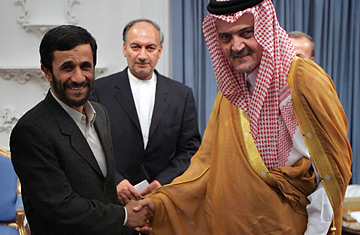
Iranian President Mahmoud Ahmadinejad (L) shakes hands with Saudi Foreign Minister Prince Saud al-Faisal bin Abdul Aziz (R) in Tehran June 12, 2006.
Already, however, the cracks in the brittle facade of the new policy are beginning to show:
The Iraqi government has made clear its opposition to U.S. efforts to counter Iranian "meddling", because the Iraqi government sees Iran as a friend. "We have told the Iranians and the Americans, we know that you have a problem with each other, but we are asking you: Please solve your problems outside Iraq," Prime Minister Nuri al-Maliki recently told CNN. "We don't want the American forces to take Iraq as a field to attack Iran or Syria." Nor is it only the ruling Shi'ite Alliance that views Iran as friend rather than foe. "If you exclude the Sunnis, the majority of Iraqis think of Iran as a friend," Kurdish legislator Mahmoud Othman told the L.A. Times. In other words, the U.S. claim of Iran being a negative factor in Iraq is shared only by the political leadership (parliamentary and insurgent) of the Sunni minority. Shi'ite and Kurdish leaders alike protested loudly when the U.S. arrested Iranian security officials in the Kurdish city of Erbil. A more aggressive U.S. stance against Iran on Iraqi soil is likely to widen the rift between Washington and the Iraqi government.
The Administration's effort to paint Iran as a source of trouble in Iraq also appears to have suffered an internal setback with the postponement of a scheduled roll-out of evidence — reportedly because top Administration officials judged that evidence to be insufficiently solid. The fact that qualms about the case against Iraq in Iran were reportedly expressed by Secretary Rice, National Security Adviser Stephen Hadley and Defense Secretary Robert Gates suggests there may be some division in the Administration over just how far to press the offensive against Iran. (As well there ought to be, since U.S. credibility may not yet have recovered from the debacle of the prewar "evidence" on which it acted against Iraq.)
The key Arab member of the proposed moderate united front is not following the Administration's lead: Not only is Saudi Arabia talking to Iran (where Washington calls for Tehran to be isolated); it is actively cooperating with Iran in shaping a political agreement to avert a civil war in Lebanon. Similarly, while the U.S. is demanding that Hamas be isolated and is pressuring Palestinian President Mahmoud Abbas to refrain from forming a unity government with the organization, Saudi Arabia is actively engaging with Hamas and promoting the formation of just such a unity government at talks currently underway in Mecca. Moreover, in the case of both Iran and Hamas, the Saudi position appears to reflect a broader view among Arab regimes that no good can come of the U.S. approach of avoiding engagement with significant regional players simply because it would prefer to keep them out in the cold — isolating Hamas, for example, simply makes it more inclined to seek help from Iran. Saudi Arabia wants to limit Iran's influence in the region, but it knows that influence cannot be ignored or eliminated.
If anything, the chorus coming from Iraq and some of the key elements of the purported anti-Iran alliance is urging the U.S. to do what the Bush Administration has steadfastly refused to do — begin talking with Iran. The Saudi cooperation with Iran over Lebanon and its engagement with Hamas in the Palestinian territories reflects the reality that Iranian influence in Iraq and in the wider region — and Hamas's centrality in Palestinian politics — are inescapable facts. And some facts can't be altered to fit a new U.S. theory of how it would like the Middle East to work.
